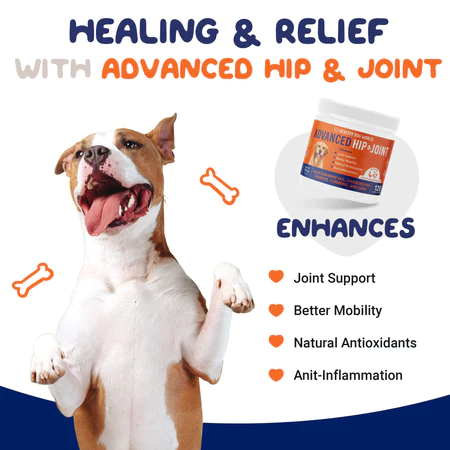Arthritis in dogs can significantly impact their quality of life, but with the right approach, it’s possible to alleviate discomfort and promote mobility. Beyond traditional medications, lifestyle changes, tailored exercise routines, and appropriate supplementation can play pivotal roles in managing canine arthritis.
Let’s explore holistic strategies to help your furry companion thrive despite arthritis. If you are looking for the best supplements for dog arthritis, you can check out Healthy Dog World.
Lifestyle Changes
- Weight Management: Maintaining a healthy weight is crucial for dogs with arthritis as excess pounds can exacerbate joint pain. Consult your veterinarian to determine the ideal weight for your dog and adjust their diet accordingly. Opt for low-calorie, nutrient-rich food and consider feeding smaller, more frequent meals to prevent overeating. Additionally, incorporating foods rich in omega-3 fatty acids, such as salmon or flaxseeds, can help reduce inflammation and support joint health.
- Comfortable Environment: Create a comfortable living space for your arthritic dog by providing supportive bedding and easy access to water, food, and outdoor areas. Consider using ramps or stairs to help them navigate elevated surfaces with minimal strain on their joints. Investing in orthopedic dog beds with memory foam or supportive padding can also provide relief by minimizing pressure points and distributing weight evenly.
- Gentle Handling: Handle your arthritic dog with care, avoiding excessive force or pressure on their joints. Use supportive harnesses or slings to assist them during walks or when getting in and out of cars. Be mindful of their limitations and adapt your interactions accordingly. Additionally, incorporating gentle massage or physical therapy techniques, under the guidance of a veterinary professional, can help improve circulation, reduce muscle tension, and enhance flexibility in arthritic dogs.
Creative Ways to Exercise Dogs with Arthritis
- Hydrotherapy: Water-based exercises offer low-impact workouts that are gentle on arthritic joints. Swimming or walking in a shallow pool can help improve muscle strength, flexibility, and overall mobility. Supervise your dog closely during hydrotherapy sessions and gradually increase the duration and intensity of their workouts. Also, incorporating flotation devices or life jackets can provide added support and confidence for dogs with limited mobility.
- Mental Stimulation: Engage your dog’s mind with interactive toys, puzzle feeders, and training exercises that don’t require excessive physical exertion. Mental stimulation can help alleviate boredom and anxiety while providing a satisfying outlet for their energy. Consider teaching new tricks or obedience commands, practicing scent work or nose games, or enrolling in canine enrichment classes to keep your arthritic dog’s mind sharp and engaged.
- Short, Frequent Walks: Instead of long, strenuous walks, opt for short, frequent outings to prevent fatigue and minimize joint strain. Choose flat, even surfaces for walking and avoid rough terrain or steep inclines. Monitor your dog’s body language for signs of discomfort and adjust the duration and intensity of their walks accordingly. Additionally, incorporating rest breaks and allowing your dog to set the pace can help prevent overexertion and ensure a positive walking experience.
Best Supplements for Dog Arthritis
While there are numerous supplements available for managing dog arthritis, it’s essential to consult with your veterinarian before introducing any new products into your dog’s regimen. Here are some commonly recommended supplements that may help support joint health and mobility:
- Glucosamine: Glucosamine is a naturally occurring compound that supports the production of cartilage, the tissue that cushions joints. It may help reduce inflammation and promote joint lubrication, potentially easing arthritis symptoms in dogs.
- Chondroitin: Chondroitin is often combined with glucosamine in joint supplements for dogs. It plays a role in maintaining cartilage integrity and may have anti-inflammatory properties, contributing to overall joint health and mobility.
- Omega-3 Fatty Acids: Omega-3 fatty acids, found in fish oil supplements, have been shown to have anti-inflammatory effects and may help alleviate arthritis-related pain and stiffness in dogs. They also support cardiovascular health and promote a shiny coat and healthy skin.
Managing dog arthritis requires a multifaceted approach that addresses lifestyle factors, exercise routines, and supplementation. Remember to prioritize your dog’s well-being and seek professional guidance whenever necessary to ensure they receive the best possible care. With dedication, patience, and a holistic approach, you can provide your furry companion with the support they need to thrive despite arthritis. Don’t forget to check out Healthy Dog World, for best supplements for dogs joints.
